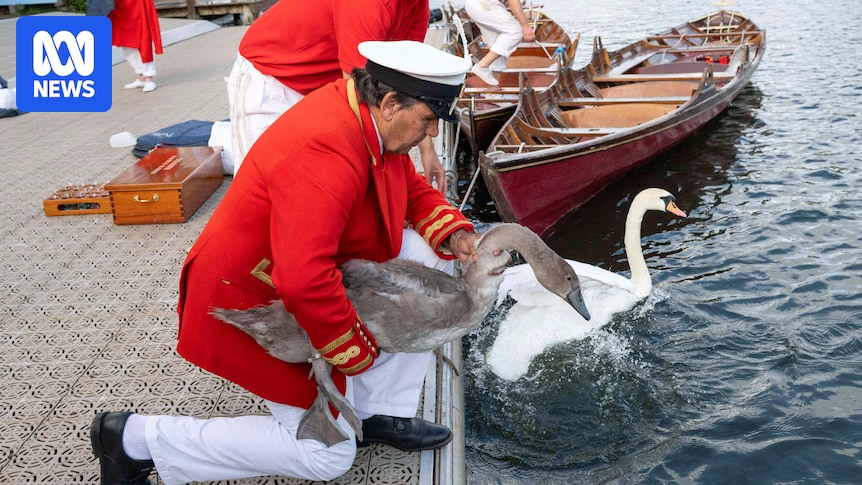The River Thames has transformed into a whirl of scarlet uniforms and wooden skiffs for King Charles III’s annual swan census.
Known as “Swan Upping”, the five-day census to assess the health of the king’s swans began in London on Monday, local time.
An official holds a swan during the Swan Upping event. (Reuters: Isabel Infantes)
One of the monarch’s lesser-known titles is Seigneur of the Swans (Lord of the Swans).
According to ancient lore, he or she owns all members of the mute swan species found in Britain’s open waters.
The census runs for five days. (Reuters: Isabel Infantes)
Every year, a team of carefully selected oarsmen — Swan Uppers — are tasked with finding the swans on a stretch of the Thames.
When a family is spotted, they shout, “All up!” and the boats quickly surround the birds, marking them and checking for signs of disease or injury.
Officials hold swans during the annual swan census. (Reuters: Isabel Infantes)
“It gives us an indication of what’s going on throughout the country,” said David Barber, who wears a scarlet jacket and a white swan feather in his cap and bears the title of king’s swan marker.
“It’s a tradition, but I think it’s serving a very useful purpose as well.”
Mr Barber has been leading the event for more than 30 years.
The Sovereign’s swan marker, David Barber. (AP Photo: Thomas Krych)
He is accompanied by a vet and oarsmen dressed in three colours: red for the king, white for the Worshipful Company of Vintners and blue stripes for the Worshipful Company of Dyers.
The last two are medieval London trade guilds that were granted ownership of some Thames swans in the 15th century.
Swan Upping is held along the River Thames near Windsor. (Reuters: Isabel Infantes)
The census tradition dates back to the 12th century, when swans were considered an important food for royal banquets and feasts.
While swans are now legally protected from hunting, they face threats from disease, pollution, vandalism and cruelty, Mr Barber said.
David Barber holds a cygnet during the annual swan census. (Reuters: Isabel Infantes)
Their numbers have declined over the past two years, primarily due to outbreaks of avian flu across Britain, according to officials.
Mr Barber said only 86 young swans were found during last year’s Swan Upping, which was 45 per cent fewer than the year before that.
But the king’s swan marker appeared positive at the end of the event’s first day, with a total of 16 young swans recorded.
ABC/Reuters
